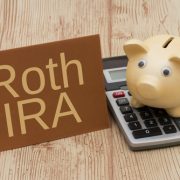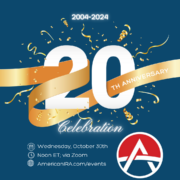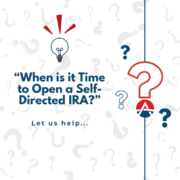Two Self-Directed Roth IRA Funding Options for High-Income Earners
Retirement savers with high incomes have options for saving but putting them into a Self-Directed Roth IRA is not one of them. One of the critical differences between Traditional IRAs and Self-Directed Roth IRAs is income limits on contributions. It is a shame because a Roth could provide tax-free growth and tax-free withdrawals in retirement.
For the 2018 tax year, here are the income eligibility limits:
- Single filer – $135,000
- Married filing a joint return – $199,000
- Married filing a separate return – $10,000
If you are part of any of these categories, you are probably not eligible to contribute to a Self-Directed Roth IRA. But that does not mean you have to rule it out completely. Your income does not have to be a total obstacle. Here are two suggestions to consider:
Think about a Roth conversion
Converting some or all of the funds in a Traditional IRA into a Self-Directed Roth IRA is a viable option. Of course, the conversion would trigger a tax bill on the converted funds up front, but your money would be growing tax-free from that point on. And since you pay the tax today, your distributions will be tax-free when you retire. This option makes particularly good sense if you think you will be in a higher tax bracket when you withdraw the funds and retirement is down the road a few years.
You can roll it over
While your Self-Directed 401(K) plan might not have a Roth option, you may still roll over to a Self-Directed Roth IRA if a triggering event occurs. Some of the most common events include:
- Reaching retirement age
- Termination of employment
- Disability
- Death
Talk to your employer to ensure that you meet one of your plan’s triggering events. Then, make sure that the amount you are taking is eligible for a rollover. Most distributions from retirement plans may be rolled over, but there are some that are ineligible. For instance, you may not roll over any required distributions you must take after reaching the age of 70 ½, and you will not be allowed to roll over any excess contributions you made.
Remember that when you roll over pretax funds, they will be subject to income tax for the year in which you did the rollover. You could be paying a significant tax bill if you roll over a large balance all at once. You might want to think about moving the funds over multiple years.
If your qualified plan has a Roth option, the tax consequences change. If there is a triggering event, you can roll these Roth assets into a Self-Directed Roth IRA. And because this transaction involves after-tax contributions, they are no income taxes due.
What about a Backdoor Roth?
In 2010, Congress passed rules that allowed retirement savers to convert funds in a Traditional IRA to a Self-Directed Roth IRA, paying the taxes on the distributions as they made the conversion. Higher-income earners were able to use this approach to gain access to a Self-Directed Roth IRA. Nicknamed a Backdoor Roth, it involves a two-step process:
Open a non-deductible Traditional IRA and make after-tax contributions. For 2018, you may contribute up to $5,500 ($6,500 if you’re age 50 or older).
Then, transfer the assets from the Traditional IRA to a Self-Directed Roth IRA. You can make this transfer and conversion at any time in the future. Some advisors are warning that the Backdoor Roth might not last forever. Restrictions on them might come at some point, requiring converters to pay a penalty, or they could include a grandfather clause. But for now, it’s an option to consider.
Seek professional help before rolling over or converting
If you are a high-income earner, you should consider everything before using retirement plan rollovers and conversions to fund your Self-Directed Roth IRA. Discuss these strategies with your team of professionals. Give us a call when you’re ready to make a move.
At American IRA, we believe that Self-Directed IRAs are the best vehicles for growing your retirement account. And we have the experience to help you with your transactions.
Interested in learning more about Self-Directed IRAs? Contact American IRA, LLC at 866-7500-IRA (472) for a free consultation. Download our free guides or visit us online at www.AmericanIRA.com.






